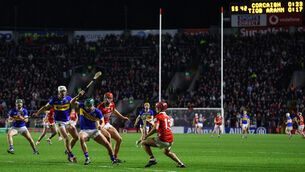Kerry no longer regal but ever so real

“You see I do believe that there is a Down way of doing things and sometimes this has been lost in translation and has become a subject of ridicule. The fact of the matter is that each county has indeed their own way of doing things. In Kilkenny that will be different to what they might do in Cork and in Galway different to what they do in Antrim and that is right we are not all cloned.”
McAteer expanded on the “Down way” to the county’s brand of football, one that has long been known as one of open and swashbuckling.












